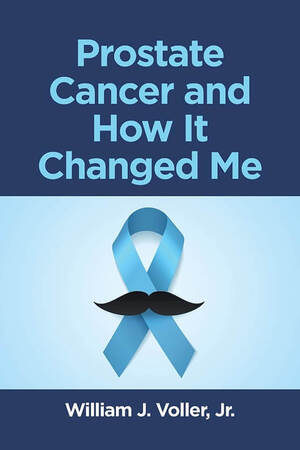The book has been on my desk for months. I flinch each time I see it. It is not a book that beckons, that entices, that lures a man to pull back its covers.
But it is a book that a man should read. His wife or partner, too.

Prostate Cancer and How It Changed Me. By William J. Voller Jr. ’74. Wheaton, Illinois.
Many of my friends have encountered prostate cancer, have dealt with it, endured its indignities along with its life-threatening capacities. Some I have known have perished from its wrath. But we hardly talk about it. It is too personal, too intimately bound to our sense of self, to our manhood.
In the letter the author wrote when sending us the book, he spoke of the number of books and articles he found by women sharing their experiences with breast cancer. He found nothing but highly technical, medically detailed books about prostate cancer. “I did not find anything that told me about how I would be impacted by it — would I die? Would it hurt?”
And yet, he writes, prostate cancer is the fifth leading cause of cancer-related deaths in men. Globally, it is the second most common cancer. About 250,000 new prostate cancer cases are diagnosed every year in the United States, with prostate cancer claiming the lives of 34,000 American men annually.
(By comparison, 264,000 U.S. women are diagnosed with breast cancer annually, with 42,000 succumbing to its effects each year.)
For those of us over 50 who get a yearly physical, one of the leading causes of trepidation is the PSA reading of our blood test. A PSA score measures prostate-specific antigens (I learned in the book) and is elevated in men with prostate cancer. It is indeed an ominous storm cloud on the horizon each time blood is drawn and analyzed. Morris Pollard, the renowned Notre Dame scientist who pioneered germ-free research here decades ago, once said that virtually every male would eventually be afflicted with prostate cancer if he lived long enough.
For all these reasons, I could not transfer William Voller’s book from my desk to the bookstacks in my office, nor did I commence reading with glee. And yet, this, too, is true: Mr. Voller has done a great service in writing this book and putting it into the conversations that men don’t want to have.
It is personal and human and real. It is an easy reading narrative that takes you along on his journey from whipping himself into great shape in his middle years only to be struck by the news of cancer living in his prostate. He describes in layman’s terms the relevance of Gleason scores; he describes in very cringe-y details what’s involved in a prostate biopsy. He expresses the relief he felt when getting the certain news, because it turned worry and speculation into a strategy for dealing with the enemy within.
One of the book’s most useful, helpful chapters is his discussion of the various strategies available to men today . . . because one of the challenges of prostate cancer is knowing just what to do about it. Some (mostly the elderly) may opt to wait it out, watch closely to see how it develops. Some, as Voller decided, have the prostate removed. He just wanted the cancer out of his body, he explains, and so chose a radical prostatectomy.
There are also radiation therapies — via external beams aimed at the cancer or radioactive seed implants inserted into the prostate. Voller also describes another course of action new to me — destructive therapies, such as freezing the prostate (cryotherapy, using liquid nitrogen or Argon gas) as well as using ultrasound energy to heat the tissue, “effectively ‘cooking’ the prostate and thus killing the cancer,” he writes.
Voller outlines the pros and cons of each (because there are tradeoffs) and explains how the disease’s progression may suggest one avenue over another. It’s all a risk.
The author writes openly about his surgery — the prep and recovery — and a couple of surprises he encountered that no doctor had alerted him to. He talks about bladder leaks and devotes a whole chapter to sex after surgery. He reveals that, despite his surgery in 2003, the cancer returned in 2006, resulting in seven weeks of radiation. He has been cancer free ever since.
Voller has used that time and a COVID shutdown to tell his story, to get it into print, so others might benefit. He does so with honesty and humor, and with a friendly manner that helps the tough scenes easier to swallow. It’s not a subject or a condition to ignore.
Kerry Temple is editor of this magazine.